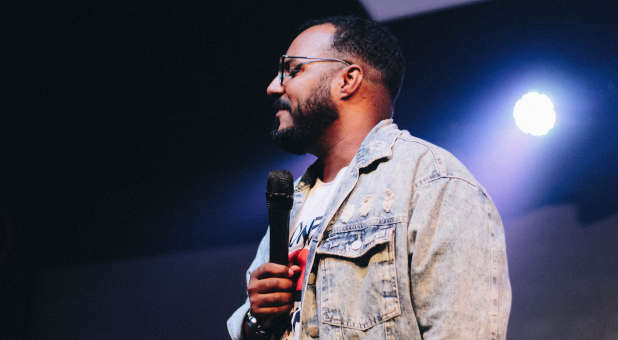Origins of the Black Church: How African Missionary History Is Relevant Today
February is Black History Month, and to continue learning about the establishing, evolution and culture of the Black church, I spoke with African American Christian leaders and educators to guide us through the history of the Black church and the critical purpose it serves as part of the full kingdom.
Our American history is rarely told from the perspective of African Americans because it can be an uncomfortable narrative for the majority population in our nation to hear and understand, but when we highlight one part of the church, it sheds more light on the whole church.
Dr. Eric Washington is kicking off this series with a discussion on missionaries and religion in Africa prior to enslavement.
Washington has been a professor of African and African diaspora history at Calvin University for 14 years, teaching on race, gender and Christian thought. His insights help paint a picture of the early events that led to what we now know as the Black church.
1. Understanding religious beliefs of predominant ethnolinguistic groups during the period of enslavement: During the period of the Trans-Atlantic slave trade (1450-1850), a vast majority of the population of enslaved Africans were coming from various regions, including:
— Senegambia, which is modern-day Senegal and The Gambia.
— “The Slave Coast” or “The Rice Coast,” which encompasses modern-day Sierra-Leone, Liberia and the Ivory Coast.
— The Night of Benin, which is now Benin and Togo.
— The Night of Biafra, which is modern-day Nigeria and Cameroon.
— Congo-Angola, which is the modern-day Democratic Republic of Congo, Angola and Ghana.
Hundreds of different ethnolinguistic groups were included in this enslavement, but anthropologists have found distinct similarities between the religious beliefs of many of these groups spanning across the African continent. Many ethnolinguistic groups practiced naturalistic religions, recognizing a high creative god while simultaneously worshipping and praying to gods or goddesses of nature as well as ancestors.
However, many Africans who were captured and enslaved were Muslims, as well as Christians, particularly in northeastern Africa. There are records that there were Christians already in Africa who were captured and enslaved.
2. The growth of Christianity throughout Africa: As the Portuguese began making contact with Africans on the western coast, many Roman-Catholic priests came to serve Portuguese traders and merchants, bringing with them the first generation of African Christians.
As more Christianity spread inland, the Congo was officially declared a Christian kingdom. Yet Christianity was largely a practice that the royals and elites participated in, while the rank and file members of the kingdom maintained their own religious beliefs and ancestral worship.
3. The Missionary Century and attempts at “civilizing” Africa: The 19th century is called “The Missionary Century” in Africa by many historians. The London Missionary Society, the Christian Missionary Society, The Paris Evangelical Society and the American Missionary Board were just some of the organizations and groups sending missionaries throughout the entire continent of Africa.
Coming out of the First Great Awakening, there was a push amongst American believers to evangelize. In Europe, however, there had been a humanitarian push to gradually ameliorate enslavement by ministering to Africans, rather than outright fighting to abolish slavery. Because of this, many Christian Europeans felt that they were obligated to “redeem” Africa from the moral tainting caused by slavery. They attempted this in three ways:
— Legitimate trade.
— The introduction of the plow to help produce and trade cash crops.
— The introduction of the Bible and Christianity.
Dr. Washington shared that in these times, the motive to “civilize” and “redeem” Africans painted a dark image of these missionaries in Africans’ eyes. Rather than seeking to help the African people, Americans and Europeans were seeking control. The Bible and the plow were the main tools that Europeans employed to try to “civilize” Africa. As Europeans offered to educate Africans, teaching them about European history, European agricultural practices and the English language, they insisted that Africans assimilate to European culture.
This movement in the 19th century created the long-term understanding by many that missionary work implies some sort of assimilation. There is an inextricable link between missionary movements and colonialism.
As the Scramble for Africa began, missionaries on the ground had paved the way for colonialism. Because of this, Washington warns that we have to understand how this colonialist mindset is still pervasive in mission work.
4. Resisting mission work as colonialism: In the late 19th century, independent indigenous African churches began with movements that resisted the colonization efforts of missionaries. These churches had learned that when missionaries attempted to enter their churches and assume leadership, they left the members feeling like second class citizens within their own churches. Therefore, they resisted missionaries who attempted to create their own churches or assume leadership positions.
How African Missionary History Is Relevant Today
Washington shared advice for those who feel called to mission work in Africa. He emphasized the importance of knowing the people you serve, in the present and historic social, economic and political situation. He advised missionaries to:
— Learn the language beforehand in order to actually be able to engage with the culture.
— Enter into the mission field as a servant, not as a professional.
— Investigate yourself and how you understand your call. (Avoid thinking that you are bringing something they “need” rather than coming alongside them.)
Washington clarified that mission work should focus on the reallocation of resources to benefit those we seek to serve, rather than attempting to change a culture in order to instill new ideas or take over. Such as:
— Seeking infrastructural change.
— Bolstering resources for those on the ground.
— Focusing on initiatives to educate and advocate for girls.
— Partnering with local organizations.
Be sure to check out the full podcast episode with Washington and stay tuned for the other episodes in our History and Evolution of the Black Church series throughout the month of February. {eoa}
Chantel McHenry is the director of special initiatives and operations at Vanderbloemen, which serves teams with a greater purpose by aligning their people solutions for growth: hiring, compensation, succession and culture. Through its retained executive search and consulting services, Vanderbloemen serves churches, schools, nonprofits, family offices, and Christian businesses in all parts of the United States and internationally.
Read articles like this one and other Spirit-led content in our new platform, CHARISMA PLUS.




























































